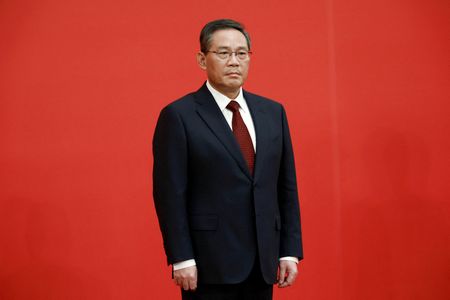By Kevin Yao
BEIJING (Reuters) – China’s next premier, who will take office in March, will have few options but to step up stimulus to revive an economy ravaged by COVID-19, policy insiders and analysts said on Monday, as the unveiling of Xi Jinping’s new leadership team rattled markets.
On Sunday, Xi was confirmed for a precedent-breaking third term as president and introduced a Politburo Standing Committee stacked with loyalists including Li Qiang, the Shanghai Communist Party chief who is now in line to succeed Li Keqiang as premier.
Li Qiang will have the job of driving growth to fend off widespread job losses that could undermine social stability, at a time when Xi is putting ever more emphasis on security.
He will inherit an economy, the world’s second-largest, that has been dragged down by strict COVID curbs and a deepening property crisis, while hopes for any meaningful reforms have diminished as the ruling Communist Party tightens its grip on the economy.
On Monday, Hong Kong stocks tumbled, Chinese stocks fell and the yuan weakened after the new line-up of China’s top governing body heightened fears that Xi will double down on ideology-driven policies at the cost of growth.
“The COVID curbs will not be loosened sharply anytime soon, the property sector won’t pick up in the near term, the pro-reform camp has been completely wiped out, hitting the confidence of investors,” a policy source said on condition of anonymity.
“The new economic team will have few options but to resort to sizeable stimulus next year to support the economy, focusing on investment and big projects,” the source added.
China’s economic tsar, Liu He, a U.S.-trained economist who is seen as the brains behind earlier reforms, will be replaced by He Lifeng, another Xi acolyte. The pro-reform central bank chief, Yi Gang, is likely to step down when he hits the mandatory retirement age in 2023, Reuters reported.
Li Qiang’s elevation surprised many policy insiders who pointed to the botched handling of a Shanghai COVID-19 outbreak that led to a two-month lockdown of its 25 million people, and his lack of experience in a national-level economic role.
“What we should do urgently is revive the economy,” Jia Kang, former head of the finance ministry’s think tank who runs the China Academy of New Supply-Side Economics, told Reuters.
“We face the problem of weakening expectations and confidence and it’s empty talk if we cannot revitalise the economy,” Jia said.
MOUNTING CHALLENGES
Xi’s push for a state-led economic model at the cost of market reforms could jeopardise his long-standing goal of turning China into a great global power by the middle of the century, policy insiders and analysts said.
China’s economic miracle started in 1978 when Deng Xiaoping kicked off historic reforms, allowing more private enterprises and opening the economy to foreign investment.
“With national security elevated to the highest-ever level amid rising geopolitical risks, how to strike a balance between development and security could be one of the most important questions for the leadership in coming years,” Citi analysts wrote after Xi unveiled his new team.
After official data on Monday showed a faster-than-expected recovery in the third quarter, investors will look for key policy agenda clues from a Politburo meeting and the annual Central Economic Work Conference, both of which are expected in December.
In September, China’s surveyed urban jobless rate nudged up to 5.5%, the highest since June, as COVID curbs squeezed businesses, with the unemployment rate for job seekers between 16 and 24 at 17.9%.
China is on track to miss its annual growth target of around 5.5% – the latest Reuters poll forecast 2022 growth at 3.2%. The poll showed China’s growth could pick up to 5.0% in 2023, helped by a lower base.
Xi’s Standing Committee choices disappointed investors who had been hoping he would keep some reform-minded officials, including former Guangdong party boss Wang Yang.
“There is likely to be more deference to Xi Jinping’s own views about how to move the country and the economy forward,” Alvin Tan, head of Asia FX Strategy at RBC Capital Markets in Singapore, said.
(Reporting by Kevin Yao; Editing by Tony Munroe and Andrew Heavens)

